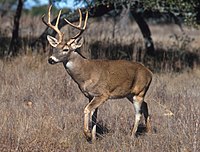
Photo from wikipedia
The transmission characteristics of prion diseases are influenced by host prion protein sequence and, therefore, the host species. Chronic wasting disease (CWD), a prion disease of cervids, has widespread geographical… Click to show full abstract
The transmission characteristics of prion diseases are influenced by host prion protein sequence and, therefore, the host species. Chronic wasting disease (CWD), a prion disease of cervids, has widespread geographical distribution throughout North America and occurs in both wild and farmed populations. CWD prions contaminate the environment through scattered excrement and decomposing carcasses. Fresh carcasses with CWD prions are accessible by free-ranging mesopredators such as raccoons and may provide a route of exposure. Previous studies demonstrated the susceptibility of raccoons to CWD from white-tailed deer. In this study, we demonstrate that white-tailed deer replicate raccoon-passaged CWD prions which results in clinical disease similar to intraspecies CWD transmission. Six white-tailed deer were oronasally inoculated with brain homogenate from a raccoon with CWD. All six deer developed clinical disease, had widespread lymphoid distribution of misfolded CWD prions (PrPSc), and had neuropathologic lesions with PrPSc accumulation in the brain. The presence of PrPSc was confirmed by immunohistochemistry, enzyme-linked immunoassay, and western blot. The western blot migration pattern of raccoon-passaged CWD was different from white-tailed deer CWD. Transmission of raccoon CWD back to white-tailed deer resulted in an interposed molecular phenotype that was measurably different from white-tailed deer CWD.
Journal Title: Viruses
Year Published: 2022
Link to full text (if available)
Share on Social Media: Sign Up to like & get
recommendations!